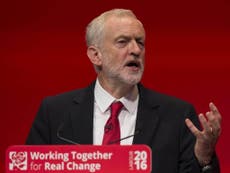Theresa May is a right-wing Tory in Ed Miliband’s clothing – don’t believe her supposedly centrist speech
Her speech could have been delivered by the last, doomed Labour leader – but adulation for her is about to fade. May faces a possible ‘Tory recession’ on her watch


Tony Blair used to say privately that the only way Labour could win power was to “talk right” (on crime, immigration, the economy) and “act left.” As Theresa May tries to colonise her “new centre ground,” is she talking centre while acting right?
At first glance, it felt like it at the Tory conference. Yet another crackdown on immigration by Amber Rudd, the Home Secretary, who looked to me as if she was acting under orders from Downing Street. “Theresa still wants to be Home Secretary,” one minister muttered.
A new wave of grammar schools, the Holy Grail for right-wing Tories but a very odd flagship policy when you are promising “a great meritocracy”. What about the “ordinary working class” pupils who don’t make the cut at 11?
However, taken as whole, May’s conference speech was not a right turn to traditional Toryism but a genuine pitch for a centre ground wide open after Labour’s lurch to the left and with the Liberal Democrats off the public’s radar. The Tories will never have such a golden opportunity to grab and hold the centre.
Knowing that she is a blank page to the voters, May began to spell out her vision and mapped out a very ambitious agenda. Her pledge to use the power of the state as “a force for good” to help the working classes, and promise that she is “coming for” tax avoiders and irresponsible bosses, mark a big change for a party committed to shrinking the state since the Thatcher era. Much of her speech could have been made by Ed Miliband. Right-wing newspapers which attacked his proposed energy price freeze will doubtless praise May’s threat to intervene in the same market.
Although the Prime Minister’s speech was light on policy, she intends to put flesh on the bones in the coming months on housing; broadband; regional growth; and corporate governance, as well as the energy firms. She dropped a hint that the era of quantitative easing or printing money is coming to an end because it helps those at the top rather than the bottom.
But will the reality match the rhetoric? We don’t know. “We need a big emblematic policy to show what is at the heart of Mayism,” one ally admitted. If she really means it, May will need to confront vested interests in her own party and its rich financial backers. Not all will welcome a bigger role for the state, interference in free markets and forcing companies to put workers on boards. May’s internal battle might not be with the exiled Cameroons but the Tory right-wingers who now cheer May. They never warmed to David Cameron’s social liberalism, and have spent four days in Birmingham convincing each other that “we have got our party back”.
Their optimism stemmed from May’s astute announcements on the Brexit process on Sunday, which prevented the conference from being dominated by demands for her to get a move on. The Europhobes are convinced that Britain is heading out of the single market. But the Sphinx-like May has not declared her hand yet. Right-wingers will be livid if they find that she is closer to the Chancellor Philip Hammond than she now appears. He is fighting the good fight for the closest possible economic ties with the EU. Other Cabinet ministers who share his view – such as Rudd and Damian Green – believe it would be counterproductive to go public, as the Three Brexiteers – Boris Johnson, David Davis and Liam Fox – have shown by thinking aloud and being rebuked by May. Although the game is not over, the forces urging a “soft Brexit” seemed to be heavily outgunned this week by the “hard Brexit” brigade.
Just as it eclipsed the conference, Brexit will inevitably tower over the Government’s domestic agenda and could prevent May implementing the goals she has set out. Ministers are rightly worried about the last six months of the two-year Brexit negotiations. There are fears that in late 2018, with a deal still not done, foreign companies will not renew office leases in the UK and will up sticks to the EU, investing in the continent rather than in Britain. That could have a chilling effect on the economy. Project Fear’s prophets of doom before the referendum look discredited now but we are only at the start of a long and difficult game, and the warnings might yet come true. That could wreck May’s plans to help struggling working class families, who could be hit by higher inflation, job losses and more wage stagnation. The Government would not have the money to soften the blow. The anger of the “left behind” would be even greater now that May has promised to respond to their cry in the referendum.
She would take the rap for a “Tory recession” on her watch. She would not be able to say she was a Remainer back in 2016, or that it was Cameron’s referendum.
The adulation for May in Birmingham this week will fade; she is doomed to upset some people as she gets off the fence, on domestic policy as well as Brexit. “She’s a grown up; she knows it won’t last,” one Cabinet minister said as the cheers echoed around the conference hall.


Join our commenting forum
Join thought-provoking conversations, follow other Independent readers and see their replies